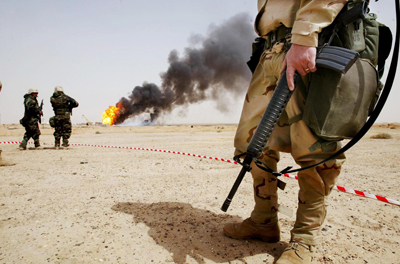Trump Touts "Making Very Big Oil Deals" As Condition For Rapid Troop Exit From Iraq
Tyler Durden
 President Trump has again vowed that all US troops will soon be out of America's second longest occupation in Iraq (behind the longest running war in Afghanistan). President Trump has again vowed that all US troops will soon be out of America's second longest occupation in Iraq (behind the longest running war in Afghanistan).
But curiously, like in neighboring Syria, he tied concluding the US mission there directly to the possibility of oil and resource benefits for American companies:
“We look forward to the day when we don’t have to be there,” Trump said during an Oval Office meeting with Iraqi Prime Minister Mustafa al-Kadhimi.
“We were there and now we're getting out. We’ll be leaving shortly and the relationship is very good. We’re making very big oil deals. Our oil companies are making massive deals.... We’re going to be leaving and hopefully we’re going to be leaving a country that can defend itself.”
Over the past months the president has been on record as desiring a troop withdraw as soon as possible, following tensions in January which nearly took the Pentagon to war against Iran-backed Shia militias in the country, in the wake of the US assassination of IRGC Quds Force chief Qassem Soleimani.
But the persistent key question remains as to the future presence of the some 5,000 US troops still in the country is the timetable.
When pressed by reporters on the issue, Trump turned to Secretary of State Mike Pompeo, who replied: “As soon as we can complete the mission. The president has made very clear he wants to get our forces down to the lowest level as quickly as we possibly can. That’s the mission he’s given us and we’re working with the Iraqis to achieve that.”
So it appears these twin objectives have emerged out of years of endless mission-creep and ambiguously defined "justifications" for staying there (a hallmark of the so-called 'war on terror' era: forever shifting objectives, or in some cases no objectives at all):
- Countering Iran and leaving an Iraqi security force strong enough to be fully independent of the Shia militias.
- "Make very big oil deals," as Trump underscored Thursday.
On the latter note, a handful of American companies have been named as central to Iraq energy deals, per the Associated Press:
On Wednesday, Energy Secretary Dan Brouillette announced energy agreements worth up to $8 billion between the Iraqi minsters of oil and electricity and five U.S. companies — Honeywell, Baker Hughes, GE, Stellar and Chevron. Brouillette said U.S. private investment will help Iraqi's energy sector and stressed a need for Iraq to reduce its dependence on energy from Iran.
Meanwhile, across the border in Syria the US mission appears the same, given that for two years now US troops have been "securing the oil" - with deals for US entities to upgrade the facilities in Deir Ezzor in the works, namely the little known US-based firm Crescent Delta Energy.
At the UN this week, Syrian representative Bashar al-Jaafari slammed Washington for its ongoing brazen theft of the sovereign country's oil and gas.
 our mission: our mission:
to widen the scope of financial, economic and political information available to the professional investing public.
to skeptically examine and, where necessary, attack the flaccid institution that financial journalism has become.
to liberate oppressed knowledge.
to provide analysis uninhibited by political constraint.
to facilitate information's unending quest for freedom.
our method: pseudonymous speech...
Anonymity is a shield from the tyranny of the majority. it thus exemplifies the purpose behind the bill of rights, and of the first amendment in particular: to protect unpopular individuals from retaliation-- and their ideas from suppression-- at the hand of an intolerant society.
...responsibly used.
The right to remain anonymous may be abused when it shields fraudulent conduct. but political speech by its nature will sometimes have unpalatable consequences, and, in general, our society accords greater weight to the value of free speech than to the dangers of its misuse.
Though often maligned (typically by those frustrated by an inability to engage in ad hominem attacks) anonymous speech has a long and storied history in the united states. used by the likes of mark twain (aka samuel langhorne clemens) to criticize common ignorance, and perhaps most famously by alexander hamilton, james madison and john jay (aka publius) to write the federalist papers, we think ourselves in good company in using one or another nom de plume. particularly in light of an emerging trend against vocalizing public dissent in the united states, we believe in the critical importance of anonymity and its role in dissident speech. like the economist magazine, we also believe that keeping authorship anonymous moves the focus of discussion to the content of speech and away from the speaker- as it should be. we believe not only that you should be comfortable with anonymous speech in such an environment, but that you should be suspicious of any speech that isn't.
www.zerohedge.com
| 



